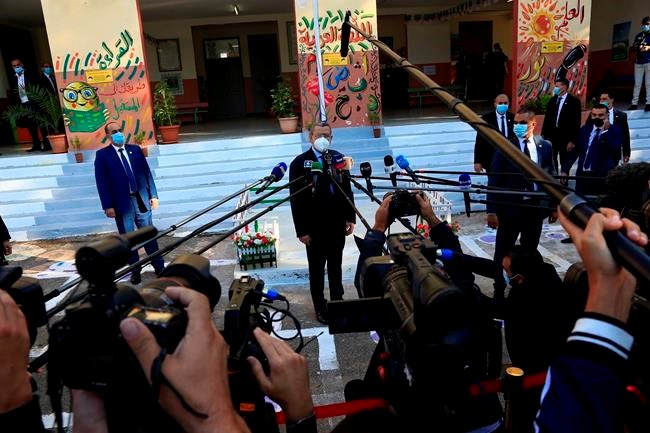ALGIERS, Algeria — Algerians voted Sunday on whether to approve a revised constitution that imposes term limits, promises new freedoms and is aimed at answering demands from pro-democracy protesters who pushed out their long-serving, autocratic president last year.
Turnout hit a record low, however, as opponents of the amended constitution called for a boycott after they were barred from campaign venues or from expressing their views on public television or radio. The referendum took place symbolically on the 68th anniversary of the beginning of Algeria's war for independence from France.
Results are expected to be announced by the interior minister Monday.
Overall turnout was just 23.7%, the lowest of any Algerian election to date, electoral authority president Mohamed Charfi told reporters after polls closed, saying the virus pandemic scared many voters away. There is no minimum turnout required to make the referendum valid.
In one example of public discontent, residents in the opposition bastion of Tizi-Ouzou shut down voting stations to protest the referendum, prompting electoral authorities to annul the voting in 63 of the region's 67 towns.
Pro-democracy activists say the revised charter doesn’t go far enough to open up politics to a new generation of leaders. Islamist parties say it doesn't do enough to promote Islam and the Arabic language, and oppose a measure on religious freedom.
Meanwhile, the man who pushed for the referendum, President Abdelmadjid Tebboune, is hospitalized in Germany after several people in his administration showed symptoms of the virus. The 74-year-old's exact ailment and whereabouts are unclear, though a presidential adviser said Sunday that Tebboune was “in good health” and continuing to undergo medical examinations.
For many Algerians, the most dramatic proposed
The military has long played a key role in Algeria, and military chief Gen. Said Bengriha has campaigned around the country for a “yes" vote.
The revision of the constitution was among promises the president made when he was elected in December. It limits presidents and parliament members to two terms, makes it easier to create political parties, and hands some presidential powers to the prime minister, among other changes.
During a final campaign rally Wednesday, Prime Minister Abdelaziz Djerrad said the amendments would “make it possible to definitively turn the page on the old practices of management of public affairs, with the emergence of new institutions and new methods of exercising responsibilities based on democracy, competence, transparency.”
He insisted that it “reflects the major demands” of the Hirak protest movement, and will give young people and non-governmental actors more of a say in Algerian policies.
Hirak activists and their supporters, who want a wholesale overhaul of Algeria's leadership, see the referendum as an effort to look progressive while leaving the overall power structure in place.
“It is a denial of democracy,” professor Rachid Tlemçani told The Associated Press. “This revision is cosmetics to give a new face to the same system, which will not change.”
Some 23.5 million Algerian voters are eligible in to take part, though turnout is expected to be low because of the calls for a boycott, a
Voting stations include primary schools that were disinfected for the referendum. Voters arrived masked and were ordered to maintain social distancing via markings on the ground and walls.
Voting began Friday in the sparsely populated Algerian desert, as election officials
The Associated Press



